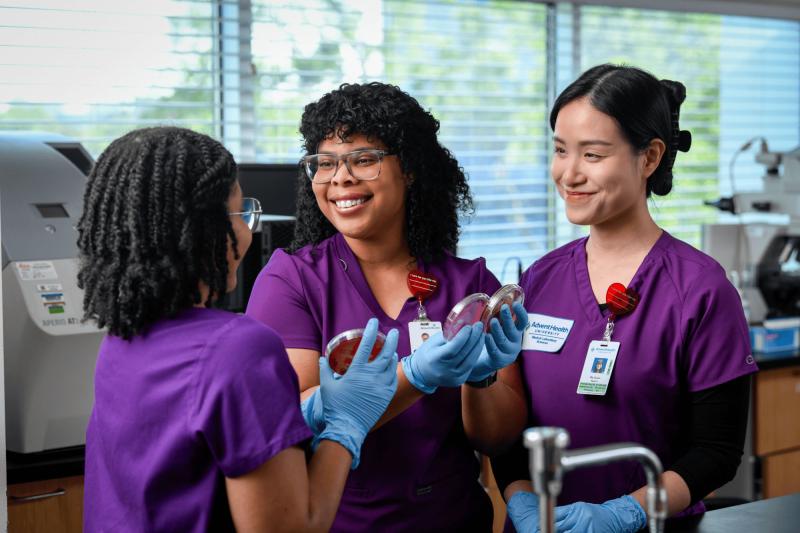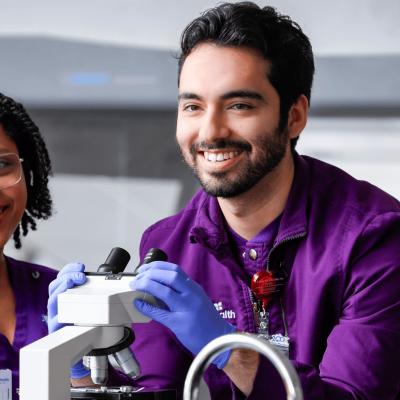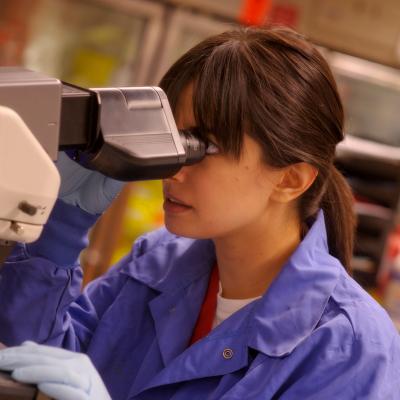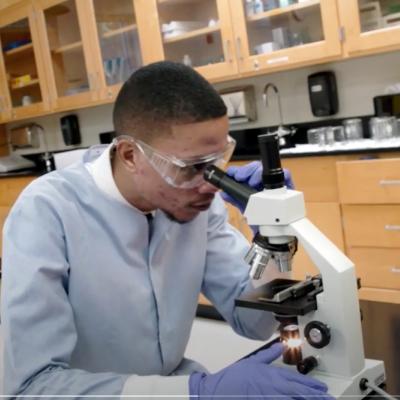- AdventHealth University

Behind many critical health care decisions — from diagnosing diseases to determining proper treatment — stands a team of highly skilled medical laboratory scientists. Their role is essential to modern medicine.
If you have a passion for science and technology and making a positive impact on others’ lives, a career as a medical laboratory scientist could be an incredibly rewarding career. Keep reading to learn about these scientists’ roles, how you can become one and what career paths are available.
What Does a Medical Laboratory Scientist Do?
A medical laboratory scientist (MLS), also known as a clinical laboratory scientist or medical technologist, is an important health care team member responsible for performing various laboratory tests on patient samples. Their valuable work provides the data our physicians need for accurate diagnoses and effective patient care.
Their daily responsibilities include the following:
- Analyzing patient samples, including blood, tissue, urine and other bodily fluids
- Conducting blood typing and cross-matching to ensure safe blood transfusions, (known as immunohematology)
- Conducting complex tests using sophisticated laboratory instruments, like microscopes, cell counters and automated analyzers
- Communicating test results clearly and accurately to physicians, nurses and other health care providers
- Examining blood cells to detect conditions like anemia, leukemia and other hematological disorders
- Identifying microorganisms, including bacteria, viruses, fungi and parasites that cause infections
- Implementing rigorous quality control procedures to guarantee the reliability of test results
- Measuring critical chemical components in the blood, like glucose and electrolytes, to monitor patient health
- Operating, calibrating and maintaining advanced laboratory equipment to ensure accuracy and precision
Medical laboratory scientists' findings directly influence decisions regarding patient diagnoses, treatment strategies and ongoing health monitoring. Their expertise is highly valuable in fields ranging from infectious disease control to cancer diagnosis and the management of chronic diseases.
Steps to Becoming a Medical Laboratory Scientist
The journey to becoming an MLS involves distinct educational and professional steps. Here’s the typical pathway:
Earn Your Bachelor's Degree
A bachelor's degree is the foundation for this career. While related science degrees can sometimes provide a path for this career, pursuing a Bachelor of Science in Medical Laboratory Science is the most direct and beneficial route. This specialized MLS degree equips you with the focused knowledge and practical skills required for the profession.
Our medical laboratory sciences program is designed to meet these rigorous standards. It offers a curriculum rich in areas like molecular diagnostics, immunology, hematology and clinical chemistry. Our unique structure may allow you to complete your degree more efficiently, potentially in three years, and be ready to enter the field sooner.
Develop Skills and Gain Experience
Beyond coursework, a quality MLS program helps you develop the professional skills you need to succeed. You'll hone your analytical reasoning, attention to detail, critical thinking and problem-solving abilities. You’ll also gain experience with complex laboratory technology and develop a strong understanding of laboratory safety and ethical practices.
At AdventHealth University, we know that hands-on experience is the key to unlocking your potential as a future health care professional. Our affiliation with the extensive AdventHealth health care system provides exceptional opportunities for integrated clinical rotations. You'll gain invaluable real-world experience working with patient samples in modern laboratory settings under the guidance of experienced professionals.
Obtain Medical Laboratory Scientist Certification
After completing your bachelor's degree program, the final step is achieving professional certification. While specific requirements can vary by state and employer, obtaining an MLS certification is standard and often essential for employment.
The American Society for Clinical Pathology (ASCP) Board of Certification (BOC) offers the most widely recognized certification, leading to the MLS (ASCP) credential. Earning your MLS certification signifies you meet nationally recognized standards of practice. AdventHealth University's MLS program is specifically designed to provide you with the confidence, knowledge and practical skills you need to prepare for and pass these important national certification exams.
Career Opportunities as a Medical Laboratory Scientist
Graduates of our MLS program find great opportunities with us, with over an 80% job placement rate within the AdventHealth health care system. They can find opportunities in diverse settings, including:
- Forensic science labs
- Hospitals and medical centers
- Independent diagnostic laboratories
- Pharmaceutical and biotechnology companies
- Physician offices and clinics
- Public health laboratories (state and local)
- Research institutions
- Veterinary laboratories
There’s a strong demand for skilled medical laboratory scientists, and the number is projected to grow in the coming years. The U.S. Bureau of Labor Statistics (BLS) anticipated a 5% increase in employment for clinical laboratory technologists and technicians between 2023 and 2033, which is faster than the average growth rate for all occupations. This statistic reflects the increasing importance of laboratory diagnostics in health care.
How Much Do Medical Lab Scientists Make?
According to the BLS, the average salary for a medical laboratory scientist in the U.S. is approximately $61,000 annually. It's important to note that actual salaries can vary significantly based on location, years of experience, specific certifications, specializations and your employer.
Take the First Step in Your Medical Laboratory Scientist Career
AdventHealth University offers a leading-edge Bachelor of Science in Medical Laboratory Sciences program designed to prepare you for a successful career in this exciting field.
If you’re ready to take the next step and learn more about our program, you can also request information to have one of our team members contact you to answer any questions and help you get started. We look forward to partnering with you.


